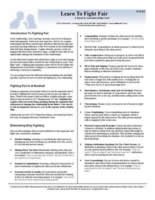All Couples Should Learn To FIght Fair. Here's How
Check out our mini-guide on how to fight fair, and stop letting badly handled conflict cause pain in your relationships. Download it NOW!
Learn to speak so others will listen and believe!
Speaking Well
Principles of Credibility by Robert Bacal
It doesn't matter who you are speaking to. Whether to a group of a thousand, a radio or television audience, or one person in the privacy of your office, much depends on your ability to come across in a credible and honest fashion. Good intentions are not enough. Many the honest, open speaker has created an impression of shiftiness and dishonesty due to a lack of understanding about how to structure content, and how to use language and speaking style to come across in a credible manner. In this column, taken from notes from our "Dealing With Hostile Groups" seminar, we provide some tips for you.
What Does Credibility Mean?
You will be perceived as credible when you:
- appear relatively unbiased
- appear similar to the audience
- communicate in ways the audience understands
- demonstrate understanding of the audience's opinions
- do not sound defensive or aggressive
- do not over react to criticism
Specific Tips
1. Don't oversell or ignore downsides from the audience's points of view. Research suggests a mix of focusing on evidence to support your position AND considering objections is most effective.
2. Pre-empt attacks by bringing up audience concerns yourself. For example: "I know some of you are probably thinking [fill in objection]. Let me address that."
This is much better than ignoring these until an audience member attacks you with an objection.
3. Match your language to the audience. That is, stay away from all bureaucratic language and abbreviations, unless your entire audience is very familiar with them. Even then, explain the abbreviations.
Match your language to the anticipated educational levels and dialects of the audience members. Don't use huge words, or language that isn't used in the world your audience lives in. Don't use long, convoluted sentences, either. Speak like them!
4. Whenever possible DON'T READ A PREPARED SPEECH. This reduces your power of influence, and credibility. Very few people are able to read a speech effectively. Most attempts at reading make you appear to be unconfident, stiff, and artificial. Reading occasional quotes, however, is OK.
5. Generally, a lectern separates you from the audience. Consider using a wireless microphone so that you can leave the lectern, or dispense with it entirely. However, if you must use a lectern, don't use a death grip on it. The audience will perceive this as discomfort and stiffness. By the way, walking around is relaxing for you (usually), and is more interesting for the audience.
6. Use a well-organized structure for your presentation. Use the old saw: Tell em what you are going to tell them. Then tell them. Then tell them what you told them. This corresponds to the introduction, body, and conclusions/summary.
7. When using the above structure, indicate in your opening that you imagine that some have concerns, that you will be addressing. Then, in your body, present both sides. You may want to emphasize any positives you have identified.
8. Speak with energy and intensity to show your commitment to your topic, but don't go "over the top", by sounding like a preacher or sales-person.
9. Make an extra effort to make eye-contact with people in the group. The listeners need to feel that your primary concern is each of them, not selling them on the ideas YOU have. So you want to appear as listener focused as possible.
10. Don't try to accomplish too much, or present too much information. The more you present, the less impact each point has. By trying to do too much you risk the possibility that the listeners will miss your main points, or simply get lost and frustrated.
Conclusion:
While most of the tips we have presented relate to sounding credible to a group of people, most apply to talking to individuals also. Remember that the best way to sound credible is to focus on the audience, and its concerns, rather than your concerns, or the concerns of your government. There are a good many other tactics you can apply to difficult groups or difficult people. Our half-day seminar on the subject is available to help. For more information, call us at (204) 888-9290.
Bacal & Associates publishes a help card with tons of tips to help you deal with resistant, difficult or hostile groups. If you speak to, or present to groups who are not keen on hearing or accepting what you have to say, click here for more tips and information.
 Manage Conflict - Resolve Conflict - Prevent Conflict
Manage Conflict - Resolve Conflict - Prevent Conflict 

